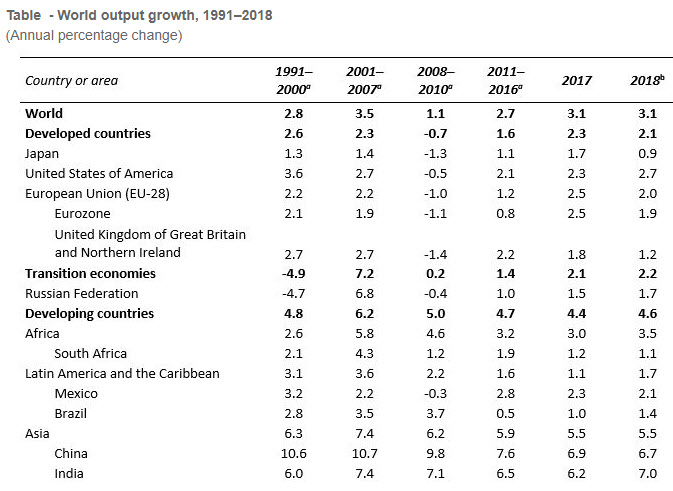UNCTAD: Trade Wars are a Symptom of Deeper Economic Problems
The world economy remains on shaky ground a decade after the 2008 financial crisis, with trade wars a symptom of a deeper malaise, according to the UNCTAD publication, Trade and Development Report 2018: Power, Platforms and the Free Trade Delusion.
While the global economy has picked up since early 2017, growth remains spasmodic, and many countries are operating below potential, states the report.
“The world economy is again under stress,” said Mukhisa Kituyi, Secretary-General of UNCTAD. “The immediate pressures are building around escalating tariffs and volatile financial flows, but behind these threats to global stability is a wider failure – since 2008 – to address the inequities and imbalances of our hyperglobalized world.”
The 2018 report examines how economic power is being concentrated in a smaller number of big international firms and the impact this is having on the ability of developing countries to benefit from their participation in the international trading system and to gain from new digital technologies.
The report states that since 2008 many advanced countries have abandoned domestic sources of growth for external ones. This can only work by tapping into other countries’ domestic demand – and among countries that do depend on domestic demand, too many are relying on a combination of higher debt and asset bubbles rather than boosting wages. In either case, growth is hindered by the ever-present threat of financial instability.
The bigger emerging economies are doing better this year, the report says, and commodity exporters can expect an improvement while prices remain firm. Except for the Russian Federation, growth in the other four BRICS countries – Brazil, India, China and South Africa –– relies heavily on domestic demand.
The report sees economic storm clouds gathering. Today’s $250 trillion debt stock – 50 percent higher than at the time of the crisis – is three times the size of the global economy. Private debt, particularly corporate debt, has been behind this surge in borrowing but without stimulating business investment, a disconnect that spells trouble ahead.
“The growing indebtedness observed globally is closely linked to rising inequality,” said Richard Kozul-Wright, lead author of the report. “The two have been connected by the growing weight and influence of financial markets – a defining feature of hyperglobalization.”
Global trade continues to be dominated by big firms through their organization and control of global value chains with, on average, the top one percent of each country’s exporting firms accounting for more than half its exports.
Whether or not they amount to a trade war, recent tariffs will disrupt the current trading system which is drawn increasingly around value chains. The consequences of any serious escalation could, through heightened uncertainty and reduced investment, bring more damaging consequences in the medium term, the report says. These could be particularly serious for countries already facing financial distress.
Trade wars are a symptom of a degraded economic system and multilateral architecture, the report says, creating a vicious circle of corporate political capture and rising inequality where money is used to gain political power and political power is used to make money.
To avoid repeating the mistakes of the 1930s, UNCTAD suggests returning to the Havana Charter, which was the initial attempt to establish a managed multilateral trading system. Doing so means taking on many new challenges unfamiliar to the signatories of the Charter in 1948 that require effective international cooperation. At a minimum, it would prioritize three actions: tie trade discussions to a commitment to full employment and rising wages, regulate predatory corporate behavior and guarantee sufficient policy space to ensure that countries can manage their integration in line with the Sustainable Development Goals.
Table - World output growth, 1991–2018 (Annual percentage change)

Source: UNCTAD secretariat calculations, based on data from United Nations Department of Economic and Social Affairs, National Accounts Main Aggregates database and World Economic Situation and Prospects: Update as of mid-2018; Economic Commission for Latin America and the Caribbean; OECD.Stat; International Monetary Fund; Economist Intelligence Unit Country Data database; JP Morgan, Global Data Watch; and national sources. Calculations for country aggregates are based on gross domestic product at constant 2010 dollars.
a Average.
b Forecasts.
